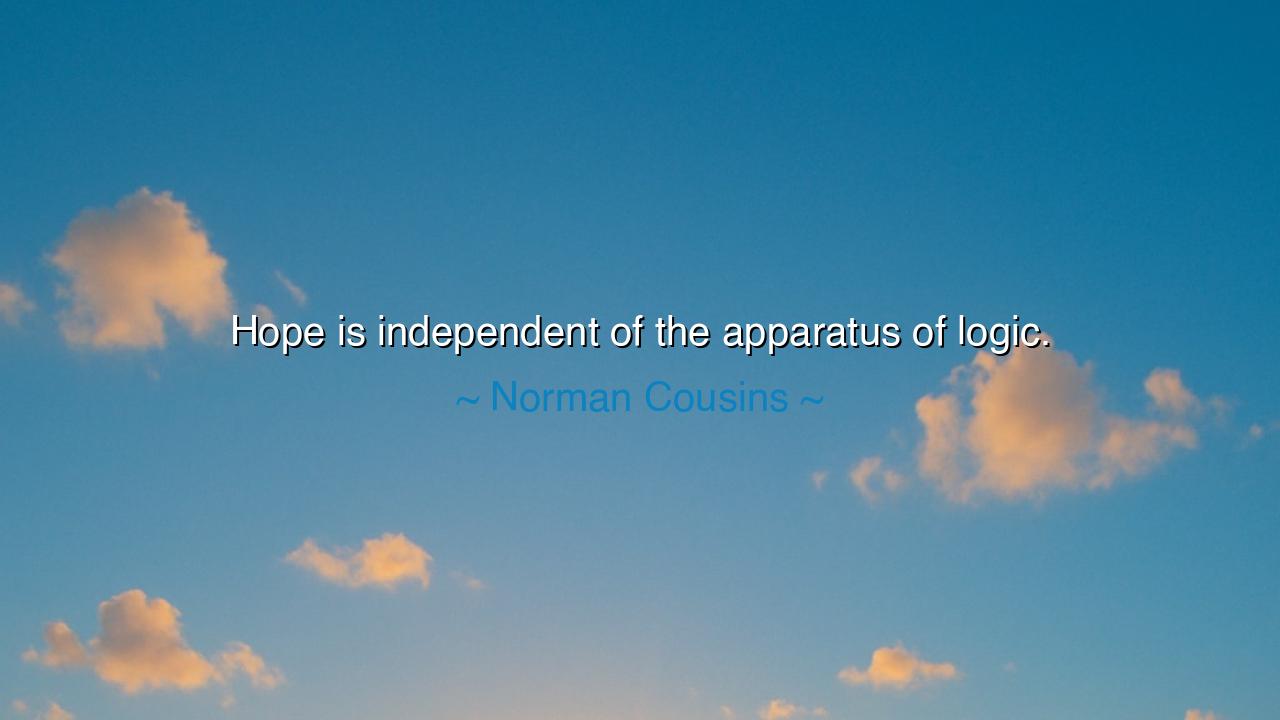
Hope is independent of the apparatus of logic.






The words of Norman Cousins — “Hope is independent of the apparatus of logic” — stand as a quiet yet radiant testament to the power of the human spirit. In them, Cousins reminds us that hope, that mysterious and luminous force, does not obey the rules of reason. It is not born from calculation, nor sustained by evidence. Hope exists where logic falters — it is the soul’s defiance in the face of despair, the song sung in darkness when all proofs have failed. To live by logic alone is to live within the walls of what is already known. But to live with hope is to stand upon those walls and gaze toward what has not yet come to be.
Cousins was not a poet or philosopher only in words, but in life. He survived grave illness through an unorthodox faith in the healing power of laughter, love, and belief. When medicine and science offered no promise, he turned to hope — that invisible medicine of the mind — and found within it a strength that baffled physicians and inspired generations. It was from that experience that he came to understand: logic has boundaries, but hope has none. Logic can measure, predict, and explain; but hope creates. It is the unseen hand that lifts the broken body and the weary heart, urging them to try once more.
To the ancients, this truth would not have been strange. The philosophers of old knew that the world was not built solely upon reason, but upon faith in what reason could not yet grasp. The Stoics spoke of the inner citadel — a fortress within each soul where no circumstance could conquer. There, in the silence beyond reason, lived hope. Even the greatest thinkers — Aristotle, Epictetus, Marcus Aurelius — admitted that the mind can guide the body, but only the spirit can endure suffering without certainty. Hope is the breath of the soul, not the product of the intellect. It is the power that enables humanity to rise from ruins and begin again.
History gives us countless examples of this sacred truth. Consider Winston Churchill in the darkest hours of World War II, when London burned and the tide of tyranny seemed unstoppable. Logic declared defeat inevitable; numbers and strategy weighed heavily against him. Yet Churchill refused to yield. He spoke to his people not with cold reason, but with hope — a hope that defied all calculation. “We shall never surrender,” he said, and in that cry was something beyond intellect — a conviction that the human will could bend the impossible. And indeed, it did. The war was not won by logic alone, but by hearts that dared to believe when reason had no answer.
There is, then, a kind of divine rebellion in hope. It is the refusal of the human soul to be ruled by despair. Logic says, “The odds are against you.” Hope answers, “I will try anyway.” Logic says, “There is no path forward.” Hope replies, “Then I shall make one.” It is not irrationality, but transcendence — the ability to see beyond what reason can compute, to sense that there is something greater than circumstance guiding our journey. The ancients might have called it faith, destiny, or the spark of the divine. Cousins, speaking in the modern age, called it hope — but the essence is the same.
And yet, Cousins does not ask us to reject logic, only to understand its limits. Reason is a tool of the mind; hope is the compass of the heart. To live wisely, one must wield both. For reason can tell us how to build a bridge, but hope gives us the courage to cross it. Reason can diagnose, but hope can heal. The harmony of these two — the measured and the miraculous — is the foundation of every human triumph. Without logic, we would be lost in confusion; without hope, we would be lost in despair.
Therefore, remember this truth, O seeker of wisdom: hope is not a denial of reality, but a declaration of possibility. When you face moments where reason abandons you — when the facts are grim, the night long, and the heart weary — do not let logic have the final word. Let hope speak. Let it whisper of light yet unseen, of strength yet untested, of life yet unfulfilled. For as Norman Cousins taught through his own miraculous endurance, hope begins where reason ends, and from that boundless space, all things become possible.






AAdministratorAdministrator
Welcome, honored guests. Please leave a comment, we will respond soon